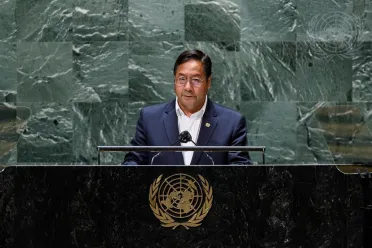Statement
Statement summary
LUIS ALBERTO ARCE CATACORA, President of Bolivia, said the pandemic has demonstrated the fragility of people and States, risking timely achievement of the 2030 Agenda. Condemning the “multidimensional crisis of capitalism”, he noted inequality between the main capitalist countries and those on the periphery has continued. The growth in extreme poverty and inequitable distribution of vaccines has been condemned by the WHO, he said, with only 30 per cent of the global population having received one dose of vaccine and barely 15.5 per cent fully vaccinated. “Capitalism has transformed all areas of social life into merchandise, and health has not escaped its tentacles,” he stated. No one should seek to profit from health during a pandemic, with transnational companies called to lift their patents and supernational organizations like the United Nations and Governments working in solidarity to avoid hoarding vaccines.
While the United States and European countries reactivate their economies with billions of dollars, Latin America, the Caribbean and Africa lack organizations fighting for recovery, he said. Instead, bodies like the Organization of American States “divide us, promoting coups d’etat”. The international community must confront multidimensional threats to economies, industries and food security, while safeguarding workers, farmers, indigenous peoples and small business, just as it protects banks and transnational corporations. However, there will be no progress if the world continues the unjust economic global order, imposing inequalities in trade. He noted e-trade could assist recovery, but the digital divide prevents many from sharing in its benefits, instead turning it into an instrument consolidating injustice. He called for international financial mechanisms to help reduce debt through concessional long-term lending.
“Our common home, Mother Earth” is suffering from consumerism and depredation of resources, he said, with capitalism a main cause of the climate crisis. He promoted Bolivia’s new “living well” model, leaving behind predation, irrational competition and the drive for profit. Looking towards COP26 in Glasgow, he called for solutions to reduce temperatures by means of distributing the carbon budget, based on common but differentiated responsibilities, and for main capitalist countries to assume their responsibilities in transfer of technology.
Unilateral coercive measures by powerful nations contravene the Charter of the United Nations and are unacceptable, he said, calling the blockade and embargo of Cuba a crime against humanity. In Bolivia, the November 2019 coup d’état was driven by many internal actors but also by the Organization of American States and former Government of Argentina. Citing massacres and summary executions, he committed his Government to restoring justice for lives lost and those exiled. He noted his Government was elected by 55 per cent of voters and has the right to free and sovereign access to the Pacific Ocean through open dialogue with the Government of Chile.
Full statement
Read the full statement, in PDF format.
Photo

Previous sessions
Access the statements from previous sessions.
